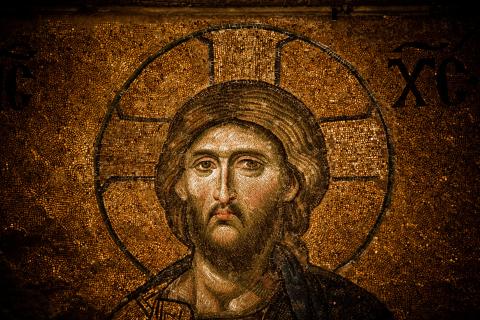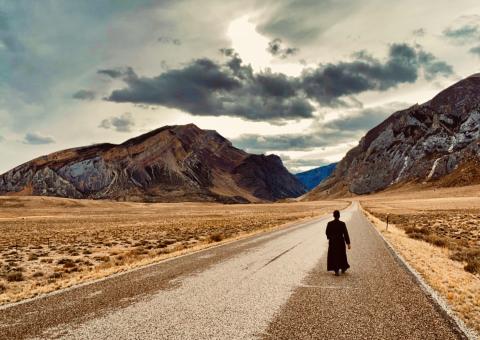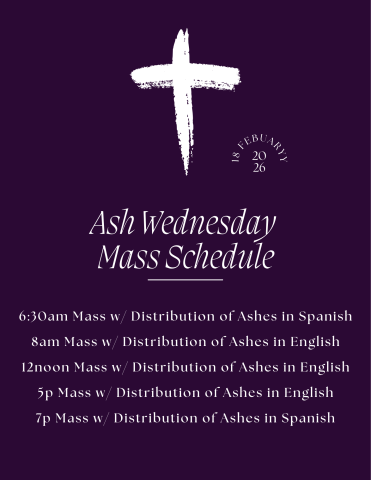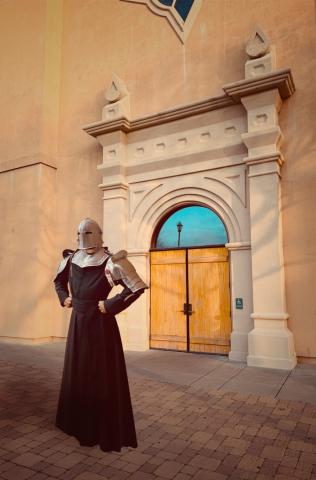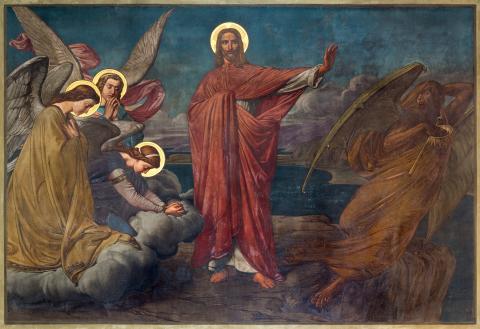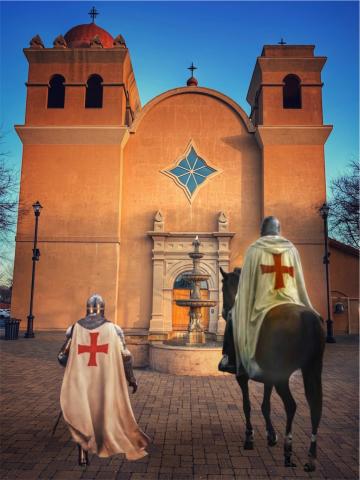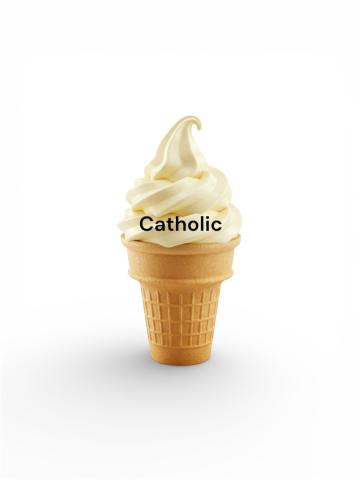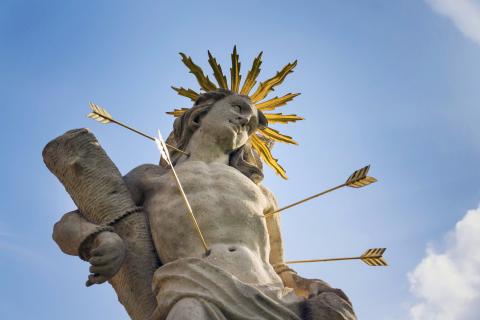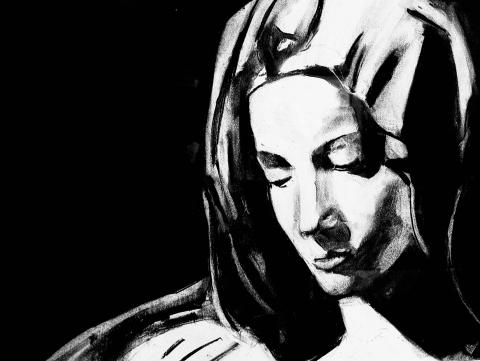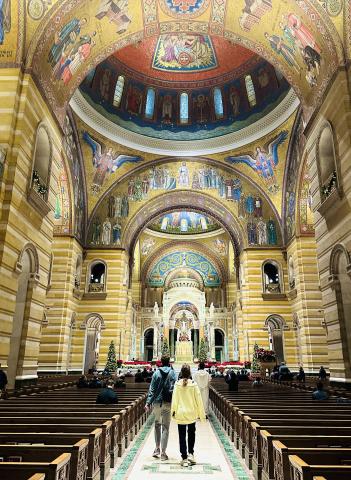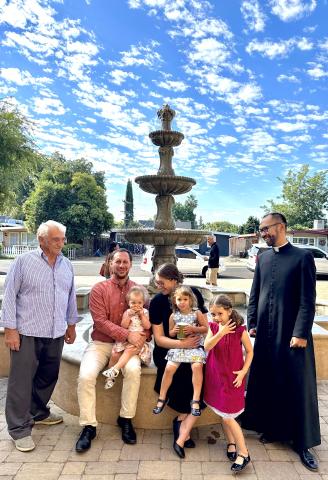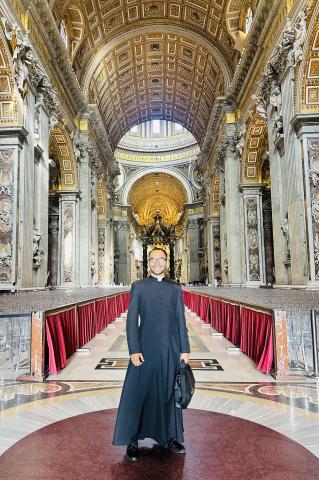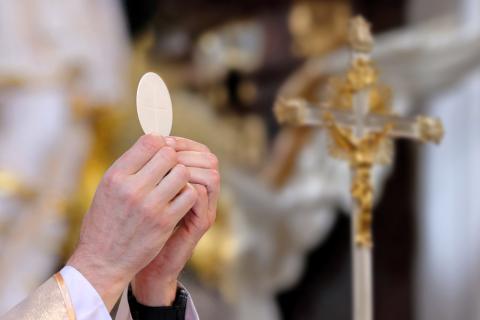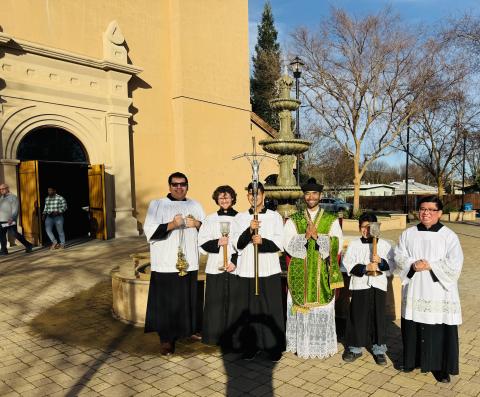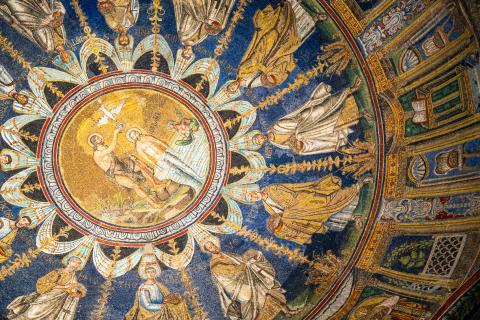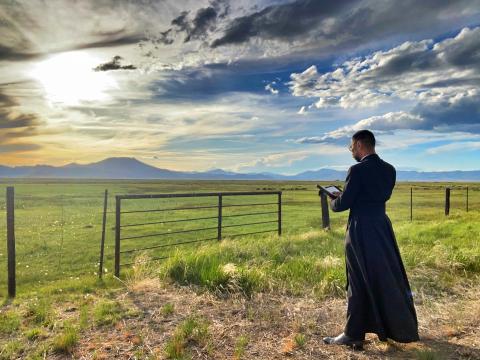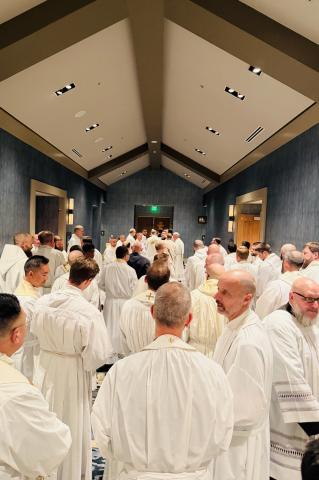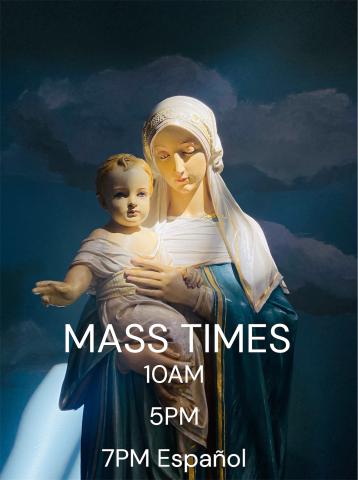Discover Fr. Brian Soliven Sermons
Fr. Brian Soliven Sermons

Fr. Brian Soliven Sermons
Author: Rev. Brian J. Soliven
Subscribed: 7Played: 129Subscribe
Share
©2025 Rev. Brian J. Soliven
Description
Brought to you by the dedicated pastor of St. Mary’s Parish in Vacaville, CA, this podcast is your gateway to insightful homilies and enriching recordings. Each episode is imbued with Father Brian’s profound spiritual guidance and wisdom, aimed at deepening your understanding of the Catholic faith. Whether you're tuning in to his reflective daily messages or the deeply inspiring Sunday sermons, you'll discover a wealth of knowledge and encouragement to light your path. Join our community of listeners and cultivate a more meaningful connection with your faith. Perfect for parishioners, spiritual seekers, and anyone yearning for God's presence in everyday life. Tune in and nourish your spirit with Father Brian's heartfelt reflections and teachings.
637 Episodes
Reverse
When you look at the eyes of Our Lord, what do you see?
--- Help Spread the Good News ---
Father Brian’s homilies are shared freely thanks to generous listeners like you. If his words have blessed you, consider supporting this volunteer effort. Every gift helps us continue recording and sharing the hope of Jesus—one homily at a time.
Give Here: https://frbriansoliven.org/give
Lent is the holy season by which we willingly choose weakness over strength, pain over comfort, and the love of Jesus over my own will.
--- Help Spread the Good News ---
Father Brian’s homilies are shared freely thanks to generous listeners like you. If his words have blessed you, consider supporting this volunteer effort. Every gift helps us continue recording and sharing the hope of Jesus—one homily at a time.
Give Here: https://frbriansoliven.org/give
Lent is upon us! In this holy season, the Church asks us to purposely become weak.
--- Help Spread the Good News ---
Father Brian’s homilies are shared freely thanks to generous listeners like you. If his words have blessed you, consider supporting this volunteer effort. Every gift helps us continue recording and sharing the hope of Jesus—one homily at a time.
Give Here: https://frbriansoliven.org/give
With the approach of Ash Wednesday on February 18th, the Church once again does something both startling and merciful: she reminds us that we shall die.There is about this reminder a bracing honesty which our modern age sorely needs. We are encouraged, most days, to behave as though we were permanent fixtures in a very temporary world. We speak of plans and prospects, of improvements and entertainments, and seldom of endings. Yet on Ash Wednesday the priest marks our foreheads with ashes and speaks the plain truth: “Remember that you are dust, and to dust you shall return.” It is not cruelty. It is clarity. And clarity, in the hands of God, is always a form of kindness.Lent, then, is not a season for religious theatrics, but for reality. The Church calls us to consider the Four Last Things—Death, Judgment, Heaven, and Hell—not because she delights in severity, but because she desires our joy.Death is the great appointment we all keep. It is not an interruption of the story, but its turning page. For the Christian, death is not the collapse of meaning but its unveiling. The One we have trusted in shadows we shall meet face to face. To remember death is not to become morbid; it is to become wise. Only when we grasp that our days are numbered do we begin to truly live.Judgment, too, has been misunderstood. We imagine a cold tribunal and forget that judgment is the setting right of what has gone wrong. Every time we cry out against injustice, every time we long for truth to prevail, we are secretly longing for judgment. And the Judge is not a stranger but the very Christ who bore our sins. To stand before Him will be to stand before Love itself; it’s a love that burns away falsehood and heals what we have surrendered to Him.Heaven and Hell stand as the two great possibilities before every human soul. Heaven is not a sentimental cloud, but the solid, blazing reality for which we were made. It is the fulfillment of every pure desire, the answer to every homesick ache we have ever felt in this world. Hell, on the other hand, is not so much a torture devised by God as the final monument to human refusal, the tragic end of a will that persistently says, “I will have my own way.” In the end, we are given what we have chosen.Lent is the season in which we are invited to choose again.Through prayer, we learn to desire God above lesser things. Through fasting, we discover how tightly we cling to what cannot save us. Through repentance, we unlock doors we have long kept barred. The ashes on our foreheads are not a sign of despair but of hope, hope that even dust may be raised to glory. As February 18th draws near, we would do well not to rush past it. Let us receive the ashes. Let us ponder the Last Things. Let us allow eternity to cast its searching and saving light upon our present lives.For it is only in remembering that we shall die that we truly learn how to live. Only in facing judgment that we begin, at last, to desire Heaven.
--- Help Spread the Good News ---
Father Brian’s homilies are shared freely thanks to generous listeners like you. If his words have blessed you, consider supporting this volunteer effort. Every gift helps us continue recording and sharing the hope of Jesus—one homily at a time.
Give Here: https://frbriansoliven.org/give
When an exorcist meets with a person allegedly possessed by a demon, one of the first questions the priest must ascertain is how the demon gained access to the soul.
--- Help Spread the Good News ---
Father Brian’s homilies are shared freely thanks to generous listeners like you. If his words have blessed you, consider supporting this volunteer effort. Every gift helps us continue recording and sharing the hope of Jesus—one homily at a time.
Give Here: https://frbriansoliven.org/give
Hardwired in the soul of a man is to fight and serve. It's by divine design.
--- Help Spread the Good News ---
Father Brian’s homilies are shared freely thanks to generous listeners like you. If his words have blessed you, consider supporting this volunteer effort. Every gift helps us continue recording and sharing the hope of Jesus—one homily at a time.
Give Here: https://frbriansoliven.org/give
It is a curious mistake of the modern world to imagine that Christians best serve society by becoming bland and tame, like toothless lions. Our Lord did not tell His followers, “be like everyone else” but salt and light. He wanted them to change the world around them.Salt, after all, does not exist for its own sake. It preserves, sharpens, and reveals flavor. A society may have abundance, efficiency, and cleverness, and yet still taste oddly thin. When Christians live their Catholic faith honestly – praying when prayer is unfashionable, forgiving when resentment would be easier, welcoming life where it is inconvenient – they restore depth to the human experience. They remind the world that truth is not invented, that goodness is not a private hobby, and that love is more than sentiment. Remove the salt, and decay is not dramatic at first; it is simply inevitable.Light works differently. It does not argue with the darkness; it exposes it by being present. A single lamp does not abolish the night, but it makes orientation possible. In the same way, Catholics who live their faith publicly through works of mercy, fidelity in marriage, care for the poor, reverence for the weak,do not claim moral superiority. They simply make visible a way of living that assumes God is real and that human beings are made for more than comfort or consumption.The great contribution, then, is not power or prestige, but witness. The Christian adds to society a stubborn hope that refuses to believe evil is final, a patience grounded in eternity, and a joy that does not depend on circumstances behaving themselves. Such people are often inconvenient. Salt stings in open wounds; light reveals what some would rather keep hidden. Yet without them, society may grow cleverer and louder, but not wiser.When Catholics live as salt and light, they do not escape the world. They help save it from spoiling, and from forgetting what it is for. Remember, dear parishioner, you are called to be lions.
--- Help Spread the Good News ---
Father Brian’s homilies are shared freely thanks to generous listeners like you. If his words have blessed you, consider supporting this volunteer effort. Every gift helps us continue recording and sharing the hope of Jesus—one homily at a time.
Give Here: https://frbriansoliven.org/give
The martyrs teach us a very valuable lesson.
--- Help Spread the Good News ---
Father Brian’s homilies are shared freely thanks to generous listeners like you. If his words have blessed you, consider supporting this volunteer effort. Every gift helps us continue recording and sharing the hope of Jesus—one homily at a time.
Give Here: https://frbriansoliven.org/give
The humility of Mary sends vitriolic shivers down the spines of demons.
--- Help Spread the Good News ---
Father Brian’s homilies are shared freely thanks to generous listeners like you. If his words have blessed you, consider supporting this volunteer effort. Every gift helps us continue recording and sharing the hope of Jesus—one homily at a time.
Give Here: https://frbriansoliven.org/give
The world likes to mock Christians as silly for constantly calling upon God. It's a curious paradox at the heart of the Christian life which makes the believer appear faintly ridiculous to the sensible world: he dares to admit that he cannot heal himself. He stakes everything on Another, and does so with a cheerfulness that looks like folly. Yet it is precisely here that his courage is born. For when a man stops pretending he is whole and instead places his brokenness gladly in the hands of Christ, he discovers that reliance is not the enemy of boldness but its source. The one who knows he is being healed is freed from the exhausting labor of self-salvation, and may therefore stand upright, unashamed, and oddly fearless.
--- Help Spread the Good News ---
Father Brian’s homilies are shared freely thanks to generous listeners like you. If his words have blessed you, consider supporting this volunteer effort. Every gift helps us continue recording and sharing the hope of Jesus—one homily at a time.
Give Here: https://frbriansoliven.org/give
Consider the scene upon that Galilean hillside, dear reader. There ascends a Man—not with tablets of stone borne heavily in His hands, as once did Moses upon Sinai amid thunder and smoke—but with words that burn more fiercely than any fire, words destined to be written not upon rock but upon the living tablets of human hearts.In the old story, Moses climbed the mountain alone, veiled in cloud and terror, to receive the Law that would set a people apart. The Ten Words thundered forth, carving boundaries around conduct, marking what was holy from what was profane. They were good, those commandments; they were the very breath of God restraining the chaos of fallen man. Yet they stood external, like a fence around a garden we could not enter without stumbling.Now behold a greater ascent. Jesus of Nazareth goes up into the mountain, and the crowds follow, not in fear, but drawn by a strange authority that mingles majesty with meekness. He sits (as teachers do), yet speaks as One who needs no intermediary. Where Moses mediated between God and man, this Man is the mediation. Where Moses brought down stone inscribed by the finger of God, this Man brings down Himself – the living Word, the very finger of God made flesh.He does not abolish the ancient Law; no, He fulfills it to its utmost depth. “You have heard that it was said... but I say to you.” With each repetition, the old commandment is not merely repeated but plunged into the hidden springs of the soul. Murder becomes anger unchecked; adultery becomes lust entertained; oaths become the simple honesty of “yes” and “no.” The Law, once a boundary line drawn upon the ground, is now revealed as a mountain peak we are called to scale but this, it's not by our own strength, but by the power of the One who has already reached the summit and beckons us upward.And yet, who among us can hear these words without a secret shrinking? The Beatitudes pronounce blessing upon poverty of spirit, upon mourning, upon meekness; these qualities we possess only in fragments, if at all. The command to love enemies, to turn the other cheek, to be perfect as our Father in heaven is perfect strikes like a sledgehammer upon our self-sufficiency. We are not flattered; we are exposed. The mountain does not flatter the climber; it humbles him.So let no one suppose the Sermon on the Mount is a counsel of despair. It is, rather, the map of joy. It is the narrow path that leads to life. In Christ, the old commandments find their fulfillment, and the new commandment of love becomes not a burden but a liberation. Ascend, then, with Him; listen to His voice upon the mountain; and find that the Lawgiver has become the Law fulfilled, the Teacher the Truth incarnate, the Moses greater than Moses, leading us home.
--- Help Spread the Good News ---
Father Brian’s homilies are shared freely thanks to generous listeners like you. If his words have blessed you, consider supporting this volunteer effort. Every gift helps us continue recording and sharing the hope of Jesus—one homily at a time.
Give Here: https://frbriansoliven.org/give
Pray that the Lord may bless our upcoming Parish Crab Feed fundraiser!
--- Help Spread the Good News ---
Father Brian’s homilies are shared freely thanks to generous listeners like you. If his words have blessed you, consider supporting this volunteer effort. Every gift helps us continue recording and sharing the hope of Jesus—one homily at a time.
Give Here: https://frbriansoliven.org/give
We can’t ignore the proclamation of Jesus in today’s Gospel passage – "the kingdom of heaven is at hand.” It reverberates with mighty significance. It calls us to awaken from our slumber, as though with the trumpet of an archangel, urging us to lift our eyes from the mundane of the world and behold the extraordinary. When Christ first uttered these words, He spoke to the hopes of a people longing for more (have you noticed, by the way, the human heart always wants more and yet nothing in the world can satisfy that hunger?). The Lord’s words are a call to embrace not a realm of terrestrial grandeur, nor a kingdom of swords and spears, but one of spirit and truth. It was an invitation for all to enter into a new covenant, where God Himself would dwell among men in the flesh, making His abode in the hearts of those He loves. The historical biblical meaning of this proclamation lies not in geopolitical liberation, but in the liberation of souls. The Jews of Jesus’ time anticipated the Messiah as a political liberator; yet, in His divine paradox, Christ offered them freedom of a higher order – deliverance from sin and death, the true tyrants of humanity. The kingdom of heaven is an already-but-not-yet consummation of the divine promise—a present reality through the Church, Christ's mystical Body, and a future hope to be fulfilled in its fullness at the end of the world.. Moreover, it is a call to recognize our true inheritance as sons and daughters of the Most High. In this divine family, we find not just a distant God, but a Father who desires our conversion and holiness. We are made co-heirs with Christ, inheritors of eternal life and divine grace. It is a truth both humbling and exhilarating, that we, frail creatures of earth, are invited to partake in the divine nature, to be transformed from dust to something more beautiful and everlasting. In this vein, we must ask ourselves: are we living as children of this kingdom? Are we bearers of the light, spreading the joy and truth of this proclamation to a world in dire need of hope? Let us then examine our own lives and strive to reflect the glory and justice of our heavenly inheritance. Each of us is called to be a sign of this kingdom made manifest, to live as though the very gates of heaven might swing open at any moment. And so, as we ponder this great mystery, allow the words of our Savior to challenge us: “Is your life aligned with this ultimate reality, the kingdom He declared?”
--- Help Spread the Good News ---
Father Brian’s homilies are shared freely thanks to generous listeners like you. If his words have blessed you, consider supporting this volunteer effort. Every gift helps us continue recording and sharing the hope of Jesus—one homily at a time.
Give Here: https://frbriansoliven.org/give
It's not by accident the most important words ever uttered by Jesus, "This is my body" is also the slogan of the pro-abortion side. It's a diabolical mockery of the Creator of life.
--- Help Spread the Good News ---
Father Brian’s homilies are shared freely thanks to generous listeners like you. If his words have blessed you, consider supporting this volunteer effort. Every gift helps us continue recording and sharing the hope of Jesus—one homily at a time.
Give Here: https://frbriansoliven.org/give
** Correction: The only Catholic signer of the Declaration of Independence was Charles Carroll, not John Carroll. Although there are cousins from the same prominent Catholic family in Maryland **In the earliest chapters of human history, when humanity first awakened to the vast chasm that sin had torn between itself and God, the Almighty—rich in wisdom and mercy—established a system of sacrifice. To modern sensibilities, such practices may seem foreign, even unsettling. Yet these sacrifices were never barbaric rituals devoid of meaning. They were sacred signs, visible declarations of an invisible reality: sin creates a debt, and reconciliation demands atonement.The Israelites, chosen to bear divine truth in a world shrouded in darkness, obeyed this command with reverence. Each unblemished lamb placed upon the altar, each offering consumed by sacred fire, testified to the weight of sin and the desperate human need to be restored to God. The Temple sacrifices were not empty motions; they were solemn reminders that sin costs something and that holiness requires blood.And yet, this system was never meant to stand forever. No ritual, no matter how meticulously observed, could cleanse the human heart. These sacrifices were shadows, holy signposts pointing forward to a far greater reality, a redemptive plan set in motion “before the foundation of the world” (Ephesians 1:4). As Scripture declares, “it is impossible for the blood of bulls and goats to take away sins” (Hebrews 10:4). The altar prepared the way, but it could not complete the work.Then, in the fullness of time, the answer arrived.Jesus Christ entered the story, not as another offering, but as the offering. He is the Lamb of God who takes away the sin of the world (John 1:29). In Him, the fragmented symbols of ancient worship are gathered and fulfilled. God Himself stepped into the brokenness of human existence. The eternal Word became flesh and dwelt among us, fully divine and fully human. On the cross, Christ carried the crushing weight of our guilt, spanning the infinite gulf that sin had carved between heaven and earth.The sacrifices of old were provisional, divine lessons training the hearts of God’s people to recognize the magnitude of what was to come. In Jesus, sacrifice reaches its perfection. He is both High Priest and spotless Victim, offering Himself freely, not as a cold transaction, but as an act of unfathomable love. With His final breath, the Temple system met its completion, and the Savior’s cry echoed through eternity: “It is finished” (John 19:30).Now, standing in the light of this finished work, we are confronted with a question that cannot be ignored. Do we grasp the depth of Christ’s sacrifice? Have we allowed His love to transform us? Scripture calls us not merely to admire the cross, but to respond to it – offering our own lives as living sacrifices, holy and pleasing to God (Romans 12:1).In the Lamb of God, redemption is complete.
--- Help Spread the Good News ---
Father Brian’s homilies are shared freely thanks to generous listeners like you. If his words have blessed you, consider supporting this volunteer effort. Every gift helps us continue recording and sharing the hope of Jesus—one homily at a time.
Give Here: https://frbriansoliven.org/give
At the Jordan River, something quietly thunderous occurs. The Son of God steps down from the glorious Heavens into the murky water not to be made clean, but to make the waters themselves a divine proclamation. He reveals the secret, robbed from humanity since the drama of the Book of Genesis, when the Serpent tricked our first parents to eat of the Forbidden Fruit. It is tempting to think of baptism merely as an elaborate cultural ritual, or even as an excuse to throw another party. No, it is so much more majestic than that. Baptism is the unveiling.Here stands Jesus, shoulder to shoulder with sinners, though He has no sin of His own to confess. In this act alone we learn something decisive about who He is. God does not reveal Himself here as a distant examiner of humanity, but as One who enters the queue, who wades into our muddied rivers and calls them holy by His presence. When the heavens open and the Father’s voice declares delight in the Son, it is not a private compliment whispered for Jesus’ ears alone. It is a public declaration of identity.“This is my beloved Son.” Before a sermon is preached, before a miracle is worked, before a cross is raised, the Son is named and loved. The order matters. Jesus does not earn the Father’s pleasure; He receives it. And here is the astonishing turn of the Christian story: what is revealed in Him is not meant to stop with Him.For if Christ steps into the waters on our behalf, then we step out of them in His. Baptism, ours and His alike, is not chiefly about our decision for God, but God’s declaration over us. In Christ, we are drawn into that same pronouncement of love. We do not become sons and daughters by striving, but by being joined to the Son.Thus the Jordan becomes a mirror. When we look upon Jesus baptized, we glimpse our own true identity—often obscured by fear, failure, or frantic self-invention. Beneath all these lies a deeper truth spoken from heaven itself: you are beloved. And once a man or woman truly hears that, the whole of life, like the river itself, begins to flow in a new direction.
--- Help Spread the Good News ---
Father Brian’s homilies are shared freely thanks to generous listeners like you. If his words have blessed you, consider supporting this volunteer effort. Every gift helps us continue recording and sharing the hope of Jesus—one homily at a time.
Give Here: https://frbriansoliven.org/give
Keep searching for God, never stop. Never cease. True happiness awaits those who endure.
--- Help Spread the Good News ---
Father Brian’s homilies are shared freely thanks to generous listeners like you. If his words have blessed you, consider supporting this volunteer effort. Every gift helps us continue recording and sharing the hope of Jesus—one homily at a time.
Give Here: https://frbriansoliven.org/give
Every human heart carries a hunger that no success, pleasure, or good work can ever fully satisfy. We chase after many things, hoping they will quiet that ache, yet they leave us restless still. This hunger is not a flaw in us; it is a clue placed there by God Himself. And when we come to Jesus Christ, we discover that He is not merely one answer among many, but the Answer our hearts have been seeking all along.
--- Help Spread the Good News ---
Father Brian’s homilies are shared freely thanks to generous listeners like you. If his words have blessed you, consider supporting this volunteer effort. Every gift helps us continue recording and sharing the hope of Jesus—one homily at a time.
Give Here: https://frbriansoliven.org/give
The Word becoming flesh is a direct response to the shame endured by our first parents in Genesis 3:10.
--- Help Spread the Good News ---
Father Brian’s homilies are shared freely thanks to generous listeners like you. If his words have blessed you, consider supporting this volunteer effort. Every gift helps us continue recording and sharing the hope of Jesus—one homily at a time.
Give Here: https://frbriansoliven.org/give
Christmas has a peculiar way of catching us off guard. Even those who approach it with little religious intention often find themselves unexpectedly moved. There are the lights, of course, small defiances of darkness that seem to insist, stubbornly, on hope. There is the scent of evergreen, trees that refuse to play along with winter’s story of decay. Our tables groan under the weight of food, and for a brief moment, in houses that are otherwise quite ordinary, we dine like kings in castles we only half-believe in. We laugh, we sing, and sometimes, rather inconveniently, we cry. For Christmas has the habit of stirring not only joy, but memory and memory is often tinged with loss.This curious emotional upheaval is not accidental. Christmas reminds us that we are creatures made for relationship, and therefore made for love. We may grumble about the season’s commercialism, and not without reason. The tiresome pressure to find the “perfect gift” can make the whole affair feel suffocating. Yet even this complaint gives the game away. It reveals that we know, deep down, that shiny objects are poor substitutes for the thing we actually want. We sense that we are meant for something larger than consumption. We are not merely shoppers passing time in a well-lit store; we are beings made for communion.And this, I think, explains why Christmas persists in haunting us. If God is indeed our Maker, then it follows that He understands our design better than we do. We are not mass-produced articles stamped out by chance, but carefully imagined persons. Long before we learned our own names, we were known. Long before we could reach for love, we were made for it.One sees this truth most clearly, I suspect, at the end of life rather than at the height of it. When all the usual distractions are stripped away, the illusions lose their shine. No one, standing at death’s door, laments the possessions left unpurchased or the luxuries never acquired. Such things suddenly reveal themselves as what they always were—props, not pillars. What remains is love: the people we have given ourselves to, the people we have failed, and the question of whether we have ever truly responded to the Love that stands behind them all.Here, then, is where Christianity makes its most audacious claim. It does not say merely that love matters, but that Love itself has entered the story. The Word by whom all things were made does not remain at a safe and reverent distance. He becomes a child. The Author steps onto the stage, not as a commanding hero, but as a helpless infant. The Light enters the darkness so quietly that it can be ignored and yet so decisively, that it cannot be extinguished.This is why Christmas continues to unsettle us. It suggests that the longing we feel, the ache that no gift can quite satisfy, is not a mistake. It is a signpost. The Word became flesh and lived among us, and in doing so, He dignified our hunger for love by answering it—not with an argument, but with Himself.
--- Help Spread the Good News ---
Father Brian’s homilies are shared freely thanks to generous listeners like you. If his words have blessed you, consider supporting this volunteer effort. Every gift helps us continue recording and sharing the hope of Jesus—one homily at a time.
Give Here: https://frbriansoliven.org/give


